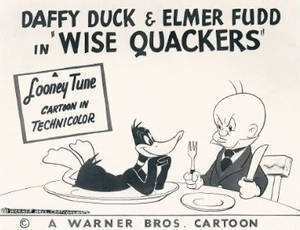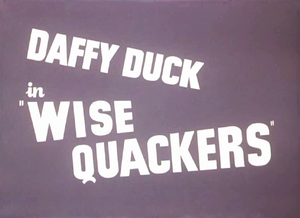Wise Quackers
| WARNING! This article contains content that may not be seen as age appropriate or upsetting for some readers. It may contain allusions to slavery deemed unsuitable for today's standards. Reader discretion is advised. |
| Wise Quackers | |
|---|---|
 Lobby card. | |
| Production company | Warner Bros. Cartoons |
| Distributor | Warner Bros. Pictures The Vitaphone Corporation |
| Release date | January 1, 1949 |
| Starring | Mel Blanc |
| Producer(s) | Edward Selzer |
| Music composition | Carl Stalling |
| Story | Tedd Pierce |
| Animation | Manuel Perez Pete Burness Ken Champin Virgil Ross Gerry Chinquy |
| Director(s) | I. Freleng |
| Series navigation | |
| ← Previous | Next → |
| Title card | |

| |
Wise Quackers is the two hundred and forty-seventh Looney Tunes theatrical short. It was distributed Warner Bros. Pictures and The Vitaphone Corporation on January 1, 1949. It was written by Tedd Pierce, produced by Edward Selzer and directed by Friz Freleng.
While flying south for the winter, Daffy Duck crash lands on Elmer Fudd's farm. Rather than being shot, Daffy agrees to be Elmer's personal slave.
Detailed summary
Memorable quotes
Characters
In order of appearance: | ||||||||||
| ||||||||||
Locations
- Earth
- United States
- Elmer's farm
- Elmer's residence
- United States
Objects
Production
Development

At the end of the 1940s, Warner Bros. had largely dropped the usage of racist caricatures of Balck people in cartoons, which included previous entries such as cartoons belonging to the Censored Eleven. The short was the last Daffy Duck entry to feature stereotyped imagery of Black people.[1]
Filming
Music
The music was composed by Carl W. Stalling.
Crew credits
- Layouts: Hawley Pratt
- Backgrounds: Paul Julian
Release
Dates are in order of release:
- United States: April 30, 1949 in theatres
Behind the scenes
- Daffy's line, "Tote that barge! Lift that bale!", comes from the song "Ol' Man River."
Legacy
- The gag where Daffy pretends to be a slave, and later Abraham Lincoln, to fool Elmer was repurposed by Bugs Bunny in Southern Fried Rabbit.
- A small sequence from this short would be used in Bugs Bunny's 3rd Movie: 1001 Rabbit Tales.
Home availability
- In the United States:
References
- ↑ Cohen, Karl F. (2004), "Racism and Resistance:Stereotypes in Animation", Forbidden Animation: Censored Cartoons and Blacklisted Animators in America, McFarland & Company, p. 54, ISBN 978-0786420322